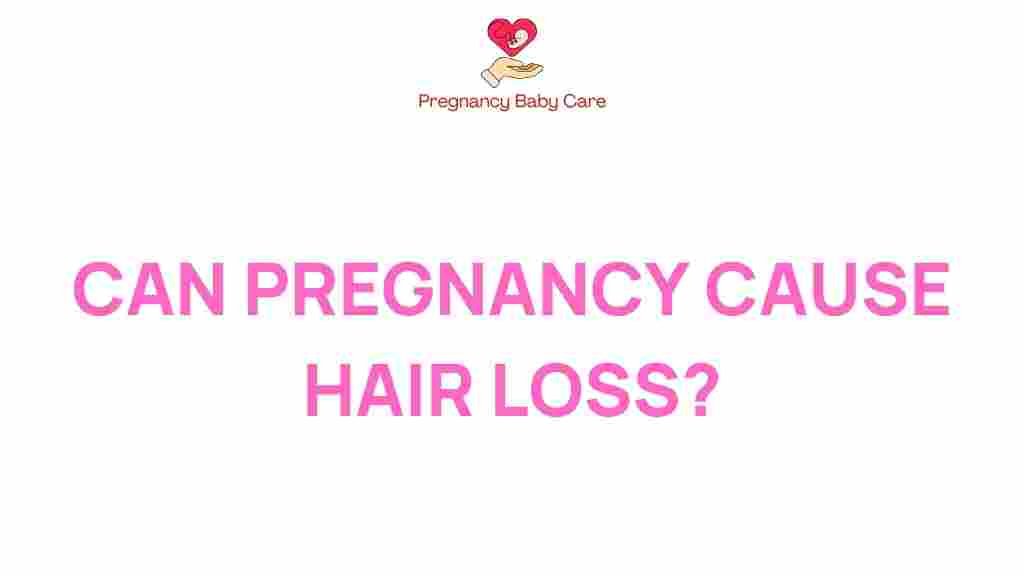Unraveling the Mystery: Can Pregnancy Trigger Hair Loss?
The journey of pregnancy is a beautiful yet challenging experience for many women. Alongside the joys of bringing new life into the world, there are numerous changes that a woman’s body undergoes, some of which can be surprising. One question that often arises is: can pregnancy trigger hair loss? In this article, we will explore the relationship between pregnancy, hormones, and hair loss, particularly focusing on the postpartum period.
Understanding Pregnancy and Hair Loss
Pregnancy is a time of significant hormonal shifts. The body produces higher levels of hormones such as estrogen and progesterone, which can have various effects on health, including the condition of hair. While many women experience thicker and shinier hair during pregnancy due to these hormonal changes, some may find themselves facing hair loss after giving birth.
The Cycle of Hair Growth
To understand how pregnancy influences hair loss, it helps to know how hair growth works. Hair growth occurs in three stages:
- Anagen: The growth phase, lasting several years.
- Catagen: The transitional phase, lasting a few weeks.
- Telogen: The resting phase, lasting a few months before hair falls out.
During pregnancy, the prolonged phase of anagen (growth) can lead to increased hair fullness. However, after delivery, many women enter a phase of telogen shedding, leading to noticeable hair loss.
The Role of Hormones in Hair Loss
Hormones play a crucial role in hair health. During pregnancy, elevated estrogen levels help maintain hair in the growth phase. After childbirth, estrogen levels drop, resulting in a shift that may trigger excessive shedding. This can be particularly pronounced in the postpartum period, where women might experience:
- Increased hair shedding
- Thinning hair
- Patchy hair loss in some cases
Understanding this hormonal influence is key to addressing hair loss concerns during and after pregnancy.
Postpartum Hair Loss: What to Expect
Postpartum hair loss, also known as telogen effluvium, typically begins around three to six months after delivery. For most women, this condition is temporary, and hair growth usually resumes within a year. However, the extent of hair loss can vary among individuals.
Factors That May Influence Postpartum Hair Loss
While hormonal changes are the primary cause of postpartum hair loss, several other factors could contribute, including:
- Stress: The physical and emotional stress of childbirth and caring for a newborn can impact hair health.
- Nutritional Deficiencies: A diet lacking essential vitamins and minerals may hinder hair recovery.
- Thyroid Issues: Hormonal imbalances related to thyroid function can also lead to hair loss.
- Genetics: Family history of hair loss can predispose women to hair thinning.
Steps to Manage and Recover from Postpartum Hair Loss
If you’re experiencing hair loss after pregnancy, there are steps you can take to support recovery and promote healthy hair growth:
1. Maintain a Balanced Diet
Focus on a nutrient-rich diet that includes:
- Protein (lean meats, eggs, legumes)
- Iron (spinach, lentils, red meat)
- Vitamins (especially B vitamins and vitamin D)
- Healthy fats (avocados, nuts, olive oil)
Consider consulting with a healthcare provider about taking prenatal or postpartum vitamins to ensure you’re meeting your nutritional needs.
2. Manage Stress Levels
Stress can exacerbate hair loss, so consider incorporating stress-reducing practices into your routine, such as:
- Yoga
- Meditation
- Breathing exercises
- Regular physical activity
3. Gentle Scalp Care
Taking care of your scalp is essential for promoting healthy hair growth. Here are some tips:
- Use a mild shampoo to prevent irritation.
- Avoid tight hairstyles that pull on the hair.
- Gently massage the scalp to stimulate blood flow.
- Consider using natural oils, such as coconut or almond oil, to nourish the scalp.
4. Consult a Professional
If hair loss persists or worsens, consulting a dermatologist or trichologist can provide insights and treatment options tailored to your needs. They may recommend:
- Topical treatments like minoxidil
- Laser therapy
- Hormonal evaluations if thyroid issues are suspected
Myths About Hair Loss During Pregnancy
There are many myths surrounding pregnancy and hair loss that can lead to unnecessary stress. Here are a few common misconceptions:
- Myth: All women will experience significant hair loss after pregnancy.
Fact: While many women experience some shedding, the extent varies greatly. - Myth: Hair loss is permanent after pregnancy.
Fact: Most women will see their hair return to its normal state within a year. - Myth: Hair loss is solely due to genetics.
Fact: Hormonal changes and other factors also play significant roles.
Conclusion
In summary, while pregnancy can lead to temporary hair loss due to hormonal fluctuations, it is a common experience for many women. Understanding the reasons behind this change can help alleviate concerns and encourage healthy practices for recovery. By maintaining a balanced diet, managing stress, and following proper scalp care, women can support their hair’s recovery during the postpartum period.
If you’re looking for further information on scalp care and beauty tips for new mothers, check out this comprehensive guide.
Remember, every woman’s body is different, and while some may face challenges with hair loss, others may enjoy the benefits of a fuller mane. Embrace your journey and take the necessary steps to care for your health and beauty during this transformative time.
For more information on health-related topics, visit Healthline.
This article is in the category Health and created by PregnancyBabyCare Team
